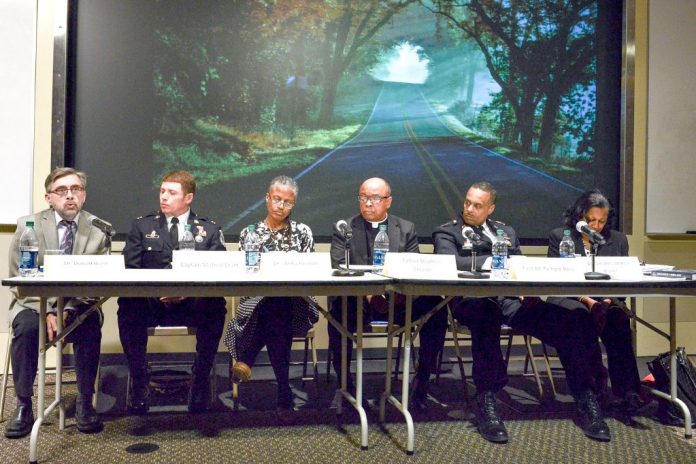Finding a solution: Holy Family University held a “Life After Ferguson: Where do we go from here?” forum on Jan. 29. About 200 people attended the event. The panel included (left to right) Dr. Donald Brash, Capt. Michael Cram, Dr. Anita Foeman, Rev. Stephen Thorne, Deputy Commissioner Richard Ross and Dr. Delores Jones-Brown. MARIA POUCHNIKOVA / TIMES PHOTO
The recent “Life After Ferguson: Where do we go from here?” forum at Holy Family University might’ve had all of the ingredients for a contentious shouting match — or at least enough of the ingredients.
The panel featured a couple of high-ranking Philadelphia police officers, several Ph.D.s and even a priest, who brought their differing and potentially contradictory perspectives to a discussion of police-community relations within the context of police killings of unarmed civilians in Missouri and New York.
The audience of about 200 for the Jan. 29 event probably covered a vast spectrum of opinions, too. The diverse group included educators and students, law enforcement professionals and many folks from the community at-large. There were white people and African-American people; young and old; and in all likelihood, people who generally like cops and those who don’t.
But an interesting thing happened when they all sat down together in the Holy Family auditorium and began talking about things like race, religion, politics and police brutality: nobody tried to shout down anyone else, no one argued.
Instead, they seemed to find a lot of common ground.
“Our goal for this forum is not to point fingers or assign blame,” said Gloria Kersey-Matusiak, a professor in Holy Family’s School of Nursing and coordinator of the university’s Diversity Team.
The forum was to “promote positive change,” identify the obstacles to improving police-community relations and to “rebuild trust for the future,” Kersey-Matusiak added. “If you’re not part of the solution, you’re part of the problem. But often, the darkest hour is just before the dawn.”
Dr. James Huber, a psychologist, licensed family and marriage therapist and associate professor at Holy Family, moderated the discussion. Panelists included Deputy Commissioner Richard Ross and Capt. Michael Cram of the Philadelphia Police Department; Dr. Delores Jones-Brown, a professor in the Department of Law and Police Science and Criminal Justice at City University of New York; Dr. Anita Foeman, a professor in the Department of Communication Studies at West Chester University; Dr. Donald Brash, an associate professor of historical theology at Palmer Theological Seminary; and the Rev. Stephen Thorne, pastor at St. Martin de Porres Parish and former director of the Office of Black Catholics in the Archdiocese of Philadelphia.
Ross said that the diversity in the panel and among spectators was encouraging because establishing dialogues with some sectors of the community can be difficult for police.
“I take part in a lot of panel discussions and this is probably one of the most diverse audiences I’ve seen,” Ross said. “(As police) we have a lot of community meetings and invariably we get a lot of the same audiences all the time.”
Jones-Brown noted that she often has a hard time convincing police from other departments to participate in public forums, so she appreciated that Ross and Cram were willing to contribute.
Huber asked each of the panelists to identify two major issues that they feel have hindered police-community relations in recent months. Jones-Brown feels that fear and stereotypes are problems. People have to start recognizing all the good work that young black men do and stop stereotyping them based on the negative actions of a few, she said.
Foeman said that parents and educators should do more to teach young people to avoid confrontations in the street with police, even if it means compromising one’s civil rights for the moment.
“That doesn’t mean the parents don’t continue to work toward civil rights, but at that moment in the street, your job is not to get shot,” Foeman said.
Cram, who commands one of the city’s most crime-ridden districts, said that the Ferguson issue doesn’t come up in his dealings with the community. Residents are more likely to complain about drug pushers on a street corner, something that affects their own quality of life directly.
One audience question that most of the panelists seemed to agree on was whether the news media contribute to racial tensions and tensions between police and the community.
“The freedom of the press bears a unique responsibility in our society,” said Brash, who argued that news organizations should be more concerned with serving the public rather than sensationalizing news for the sake of profit.
Thorne said that the news media should be included in conversations like those during the Holy Family panel discussion.
Panelists further agreed that anyone can take action to improve police-community relations and community harmony. People should talk to each other more, learn about each other, question assumptions about others and mentor young people. Even a smile can go a long way in breaking down barriers.
“We need to take the topic seriously but ourselves lightly. We all have our flaws despite our good intentions,” Huber said. “Like Martin Luther King Jr. once said, we may all have arrived on different ships, but we’re in the same boat now.” ••





